The AMD Ryzen 5 1600X vs Core i5 Review: Twelve Threads vs Four at $250
by Ian Cutress on April 11, 2017 9:00 AM ESTBenchmarking Performance: CPU Office Tests
The office programs we use for benchmarking aren't specific programs per-se, but industry standard tests that hold weight with professionals. The goal of these tests is to use an array of software and techniques that a typical office user might encounter, such as video conferencing, document editing, architectural modelling, and so on and so forth. At present we have two such tools to use.
PCMark8
Despite originally coming out in 2008/2009, Futuremark has maintained PCMark8 to remain relevant in 2017. On the scale of complicated tasks, PCMark focuses more on the low-to-mid range of professional workloads, making it a good indicator for what people consider 'office' work. We run the benchmark from the commandline in 'conventional' mode, meaning C++ over OpenCL, to remove the graphics card from the equation and focus purely on the CPU. PCMark8 offers Home, Work and Creative workloads, with some software tests shared and others unique to each benchmark set.
Chromium Compile (v56)
Our new compilation test uses Windows 10 Pro, VS Community 2015.3 with the Win10 SDK to combile a nightly build of Chromium. We've fixed the test for a build in late March 2017, and we run a fresh full compile in our test. Compilation is the typical example given of a variable threaded workload - some of the compile and linking is linear, whereas other parts are multithreaded.
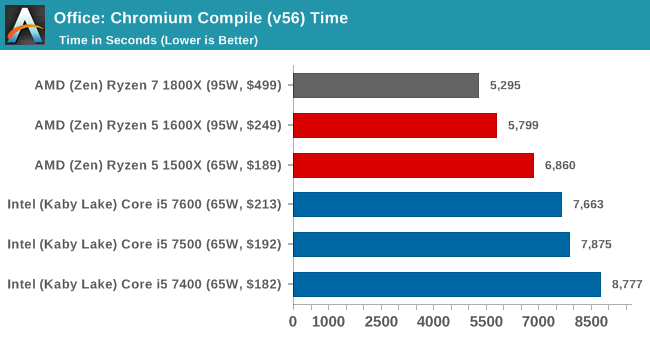
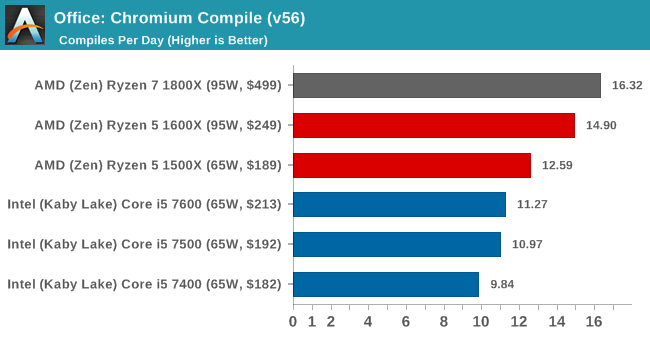
SYSmark 2014 SE
SYSmark is developed by Bapco, a consortium of industry CPU companies. The goal of SYSmark is to take stripped down versions of popular software, such as Photoshop and Onenote, and measure how long it takes to process certain tasks within that software. The end result is a score for each of the three segments (Office, Media, Data) as well as an overall score. Here a reference system (Core i3-6100, 4GB DDR3, 256GB SSD, Integrated HD 530 graphics) is used to provide a baseline score of 1000 in each test.
A note on contect for these numbers. AMD left Bapco in the last two years, due to differences of opinion on how the benchmarking suites were chosen and AMD believed the tests are angled towards Intel processors and had optimizations to show bigger differences than what AMD felt was present. The following benchmarks are provided as data, but the conflict of opinion between the two companies on the validity of the benchmark is provided as context for the following numbers.







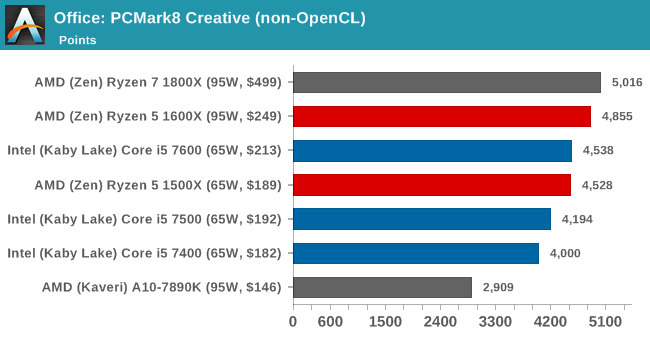
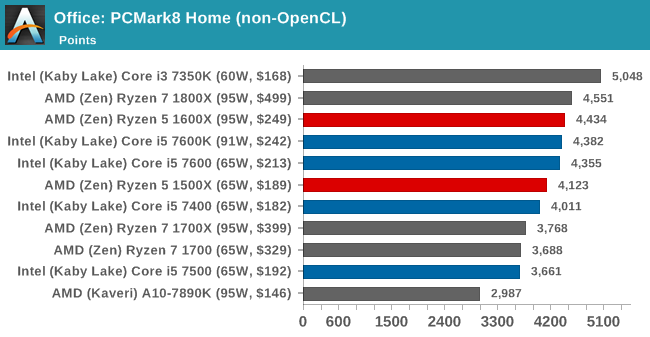
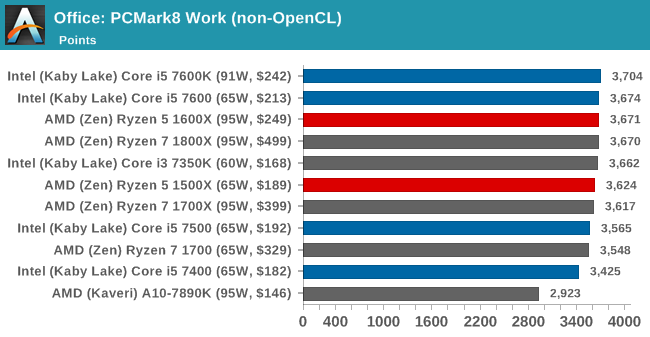








254 Comments
View All Comments
Bp_968 - Sunday, April 16, 2017 - link
This is the point I try to make all the time to console players saying PCs cost too much, require too much upgrading. My i7 970 or 980 (I forget!) Is still playing modern games wonderfully @2560x1440 with a gtx 970. We reciently built a pc for my neighbor out of spare parts and he ended up with a core2 quad (q6600 maybe?) With 6gb ram and a gtx460. He quickly upgraded to a gtx 1050 and now it easily stomps his PS4 (and probably the PS4pro).I'm with one of the previous posters about chipset accessories. It won't be CPU speed that causes me to up upgrade, it will be me wanting access to new features (pcie4, usb-c, usb3.1/3.2, NVMe, Intels ddr/ssd hybrid memory interface, etc etc).
I also expect Intel to respond, at least in the ryzen7 market. I really hope it means Intel will finnally start offering 6-8 core CPUs in non-silly price points.
mmegibb - Tuesday, April 11, 2017 - link
The choice of software hardly matters when what you are looking for is a collection of software that exercises the entire CPU subsystem: the cores, caches, memory, etc. As th3ron mentions, what matters is finding the deltas between CPUs.And yes, in spite of your snobbery, probably 50% of people reading this want to size their system for gaming. Gaming is the limiting case for my home builds.
psychobriggsy - Wednesday, April 12, 2017 - link
Indeed gaming is important for many people.What the reviews show is that for a mixed-use system, the gaming aspect is not significantly behind Intel alternatives (obviously a couple of outliers, but that applies in both directions). However for the other uses, Ryzen is a complete win. It's good enough, rather than the pile of fail that Bulldozer core CPUs were. And indications are that games are getting more multithreaded over time, so buying a 4C product is limiting future gaming.
It's clear that Intel will have to enable SMT in their i5 refreshes this year now, as that should let them claw something back in the 'partial multithreaded' use cases (apps that can't scale indefinitely with extra cores but top out at 4-8 threads).
IanHagen - Tuesday, April 11, 2017 - link
I completely agree on that. I'd love to see more compiling benchmarks too. It's coming to the point where people who are buying a CPU for productivity are taking decisions drawn upon conclusions heavily influenced by gaming performance.RafaelHerschel - Wednesday, April 12, 2017 - link
50% of people use a fast CPU for gaming is a very conservative estimate. For regular office work or for media consumption an inexpensive CPU is fast enough. The current Intel Celeron and Pentium CPUs (or the AMD equivalent) offer much better value for most people. Because of marketing i3 and i5 CPUs sell well.And there are more gamers than professionals who use software that benefits from fast CPUs.
ddriver - Wednesday, April 12, 2017 - link
Dunno about that, of all the people I know who have powerful machines, all do professional work, even those who game. Then again, the selection of my acquaintances has to do with their skills, and I do have to admit I have zero interest in interacting with someone who only plays games.I also know that is 99% of the games on the market cannot utilize 66.66% of that chip.
So you end up putting 50% of the review emphasis on tests that can only utilize 1/3 of the chip.
It is like... testing a sports car and putting 50% of the emphasis on its use as a hearse that will never be used at nowhere near its potential.
mmegibb - Wednesday, April 12, 2017 - link
Man, ddriver, you are an elitist jerk. "I have zero interest in interacting with someone who only plays games". Also, "People who use winrar most likely do not make logical considerations, because if they did, they wouldn't be using garbage like winrar".Why are you like that?
vladx - Wednesday, April 12, 2017 - link
Don't mind ddriver, he's just a pathetic troll who tries too hard.Meteor2 - Wednesday, April 12, 2017 - link
I imagine the proportion of PCs containing higher than i5-7400s bought by consumers used for gaming is much higher than 50%.*Not* talking about business buys here, I'm talking about people spending their own money.
Meteor2 - Wednesday, April 12, 2017 - link
D'oh, I just replied to ddriver. What was I thinking.